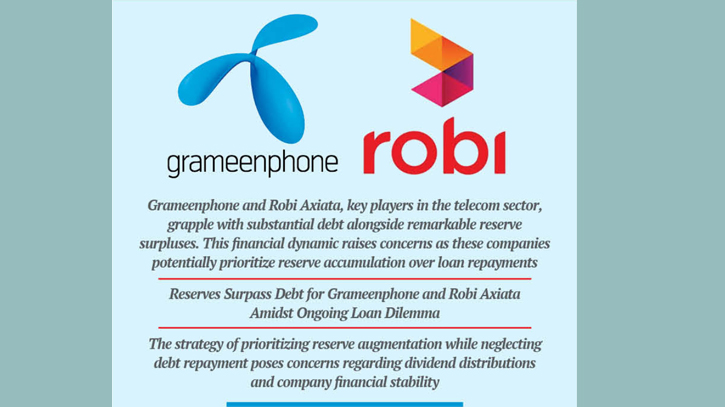
Photo : Messenger
Grameenphone and Robi Axiata Limited, both prominent multinational entities within the telecom sector, are currently contending with a significant load of both domestic and foreign debt.
Consequently, a substantial portion of their revenue is allocated towards servicing the interest accrued on these loans. However, despite this financial obligation, both companies possess reserves that far exceed their paid-up capital and outstanding debts by several multiples.
These companies are potentially augmenting their reserves by failing to meet their loan repayment obligations. This strategy, while potentially increasing their reserve funds, comes with a dual impact: a substantial outflow of funds to settle interest payments and an adverse effect on investors who are deprived of receiving substantial dividends.
According to the audited financial reports of the two companies as of December 31, 2022, the two companies have a reserve surplus of Tk 3,946.29 crore. And their total debt is Tk 1,886 crore. Among these, Grameenphone has taken loans from domestic institutions. But Robi Axiata also took loans from foreign institutions. As a result, the company has to pay interest in dollars, which added to the misery of the ongoing dollar crisis.
According to insights from experts in the capital market, the substantial reserves held by these companies indicate a likelihood of maintaining surplus funds even after settling their debts.
Clearing these loans would not only bolster the companies' financial capabilities but also reduce interest expenses. This strategic approach could significantly enhance the companies' profitability, thereby benefiting all stakeholders, including common shareholders, through increased dividends.
However, Professor Abu Ahmed, a capital market authority, expressed concerns to The Daily Messenger, saying, “The companies' actions might be disadvantaging their shareholders. By prioritizing the accumulation of funds in reserve over loan repayment, the companies are potentially denying shareholders potential profits.”
Additionally, he points out that this strategy is causing financial losses as the companies retain excessive funds in reserves without clearing their outstanding debts.
According to Dhaka Stock Exchange (DSE) data, Grameenphone Limited was listed in the capital market in 2009. The company made a profit after tax of Tk 3,009 crore 81 lakh 87 thousand 490 from January to December 31, 2022. Last year the company has a reserve surplus of Tk 2,485 crore 50 lakhs. And the company has a bank loan of Tk 503 crore 73 lakhs. They are giving interest at the rate of 4.50 percent against the loan.
Acknowledging the existence of debt, Grameenphone's company secretary, S.M. Imdadul Haque, mentioned to The Daily Messenger that maintaining lower debt levels is advantageous for any company. He highlighted that reduced debt benefits both the company and its shareholders. Haque further mentioned that while the company indeed carries some debt against its reserves, the specifics regarding this debt lie within the purview of the company's board. He suggested that the board would be better suited to elaborate on the reasons behind this debt, as it falls under their jurisdiction.
In a related context, Al-Amin, an associate professor at Dhaka University and a capital market analyst, indicated that, generally, it is preferable for a company to operate without debt. He explained that if a company follows a long-term strategy and accumulates reserves without immediately distributing profits, it might not pose a problem. However, Al-Amin emphasised that if the company isn't pursuing significant expansion plans, it would be more prudent to prioritise debt repayment over increasing reserves. This approach ensures a balanced financial strategy that aligns with the company's growth trajectory and financial stability.
Another company, Robi Axiata Limited, has a reserve surplus of Tk 1,460 crore 79 lakhs. And the total debt is Tk 1,382 crore 41 lakh 30 thousand. Out of this, the short-term loan is Tk 373 crore 85 lakh 90 thousand and long-term debt is Tk 1,008 crore 55 lakh 40 thousand.
Robi Axiata's company secretary, Mohammed Shahedul Alam, informed The Daily Messenger that the company currently holds more than Tk 1000 crore in foreign debt. He mentioned that Robi Axiata has initiated the process of seeking approval from the Bangladesh Investment Development Authority (BIDA) and Bangladesh Bank to settle this outstanding amount. Alam expressed hope that upon approval, the company would promptly proceed with the repayment.
Moreover, Alam highlighted the challenging situation the company faces due to fluctuations in currency exchange rates. He pointed out that when Robi Axiata initially acquired foreign loans, the exchange rate stood at Tk 80 per dollar. However, with the current exchange rate exceeding Tk 120 per dollar, the company now faces a difference of Tk 40 per dollar.
Dhaka Stock Exchange (DSE) Managing Director (MD) DR. ATM Tariquzzaman said, “There is no legal restriction in this case. However, to increase the capacity of the company, the debt must be reduced. In that case, both the entrepreneurs, directors, and investors of the company will benefit.”
In this regard, Mohammad Rezaul Karim, Executive Director and Spokesperson of the Bangladesh Securities and Exchange Commission (BSEC), said that companies should repay loans without increasing reserves. If the debt is repaid, the company and the shareholders will benefit more.
Messenger/Disha








